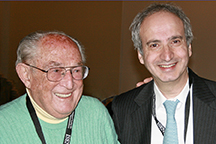
May 27, 2014 –The International Society for ECT and Neurostimulation (ISEN), the successor society to the Association for Convulsive Therapy, presented a Lifetime Achievement Award to Stony Brook Professor Emeritus Max Fink at the society’s annual meeting on May 4, 2014. Dr. Fink is internationally renowned for his leadership in ECT treatment, research and advocacy over the course of six decades.
The award was presented by ISEN President, Georgios Petrides, MD, who studied with Dr. Fink during his years as a resident and fellow in Stony Brook University’s Department of Psychiatry.
At the presentation, Edward Shorter, PhD, FRSC, Professor of the History of Medicine at the University of Toronto and a frequent collaborator with Dr. Fink, recalled some of Dr. Fink’s major accomplishments: his pioneering work at Hillside Hospital with Donald Klein, MD on the effectiveness of the new antipsychotic medications in the early sixties; his breakthrough studies with Turan Itil, MD on the effects of psychotropic drugs on the human EEG; his spirited defense of ECT against waves of attacks in the 1970’s, ‘80’s and beyond; his publication of the first modern manual on the use of ECT in 1979; his founding of the ECT journal Convulsive Therapy in 1984; his publication, with Michael Taylor, MD, of Catatonia in 2003 and Melancholia in 2006; and his successful fight to have catatonia recognized as an independent diagnosis in the DSM-5.
Dr. Shorter also cited Dr. Fink’s studies of narcotics and their antagonists and his experiments with marijuana and hashish in Athens, Greece and New York, studies supported by Stanley Yolles, then Director of the NIMH. These studies led to his invitation to join the Stony Brook faculty when Dr. Yolles became the first chairman of the Department of Psychiatry.
During the course of his presentation, Dr. Shorter mentioned Dr. Fink’s birth in Vienna in 1923, his service as a ship surgeon upon completing service in the US Army Medical Corps in 1946; the qualification in psychoanalysis by the William Alanson White Institute in 1953, and the beginning his full time academic career when he established the Department of Experimental Psychiatry at Hillside Hospital in 1954.
The key to Dr. Fink’s success, Dr. Shorter said, is that he “thinks of psychiatry as a scientific field with the same evidentiary requirements and progress through hypothesis-construction that characterizes the rest of medicine.”
In his first years at Stony Brook Dr. Fink established the Department’s Laboratory of Pharmaco-electroencephalography. He conducted research in drug treatments and EEG when the Department’s clinics were at Central Islip State Hospital and the Northport VA. In 1980 he established the ECT Service on 10-North. For the next 17 years, he encouraged the residents and fellows to publish not only in ECT but clinical studies in catatonia, melancholia, and delirium.

